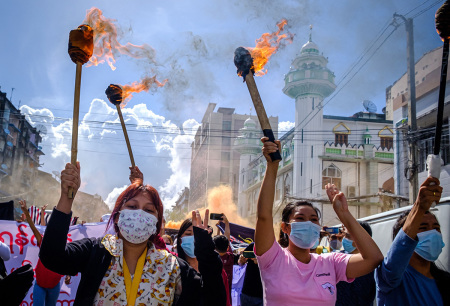‘War Crime’: Aid group condemns torching of Baptist church, entire village in Myanmar

A human rights group has condemned the burning down of an entire village, including the local church, by Myanmar’s military in the predominantly Christian and embattled state of Chin, calling it a “war crime” under international law.
The military, which staged a coup on Feb. 1, attacked Rialti village near the state’s capital of Hakha last Wednesday and Thursday, Radio Free Asia reported.
The troops initially burned some homes on Wednesday afternoon, before continuing to set buildings on fire, including that of Rialti Village Baptist Church, Thursday morning.
“This morning, it was the church and our warehouse — those two were set on fire earlier this morning and at about 9 a.m., the remaining three houses,” a local Christian leader was quoted as saying Thursday. “All were gone in a short while. The whole village, including the church, was set on fire. Eight houses were torched yesterday. In all, 13 buildings, including the church, were destroyed.”
Residents were quoted as saying that they had fled to nearby forested hills when the military arrived Wednesday and watched from afar as the buildings went up in flames.
The anti-junta Chin Defense Force militia, an armed group formed to combat Myanmar’s military in the western state, had attacked a military convoy of around 40 vehicles and two tanks headed from Falam township to Hakha, RFA said.
While the attack on the Christian village doesn’t appear to be unprovoked, the presence of the Buddhist nationalist military in Chin state, which borders India — just as in other conflict-ridden states in Myanmar — makes civilians and militias nervous. The military has been accused of vandalizing places of worship and civilians’ homes, raping girls and women, abducting civilians to be used for forced labor and shooting civilians to death.
“We see this as a war crime because wherever they go, they focus on wherever there are large numbers of people — it’s a deliberate violation of religious freedom,” Salai Za Op Lin, deputy executive director of the India-based Chin Human Rights Organization, was quoted as saying.
Op Lin noted that other Christian communities in Chin state had also been targeted since the military coup in February. “Now that the military has started a real operation in Chin state, we can expect a lot of such abuses and acts, and we urge the international community to keep a close eye on this.”
Last month, a beloved youth pastor, Cung Biak Hum of Thantlang Centennial Baptist Church, was shot dead as he tried to help one of his congregants save their burning home after it was set ablaze by the military during an attack on civilians in Chin state.
Information on his Facebook page showed that he was married with two sons and was pursuing a master's of divinity degree at MIT Yangon.
United Nations Special Rapporteur on Myanmar, Tom Andrews, highlighted the pastor’s murder in a tweet at the time, calling on the international community to “pay closer attention” to the “living hell” civilians have been experiencing there since a Feb. 1 coup brought back full military rule following years of quasi-democracy.
Myanmar’s ethnic minorities, including Christians, live in the various conflict zones across the country’s borders with Thailand, China and India. Hundreds of thousands of civilians, many of them Christians, have been displaced due to the escalation of conflicts in the zones since the coup.
Militias in those areas have been morally supporting pro-democracy protesters since the coup, which has led to the use of heavy weapons by the Burmese army. Thousands of civilians in the conflict zones have sought shelter in churches when their villages are under attack.
Prior to the military coup, Myanmar’s Parliament was scheduled to hold its first session since the country’s Nov. 8 elections in which the country’s leading civilian party, National League for Democracy, led by Aung San Suu Kyi, won 83% of available seats. The military refused to accept the results of the elections claiming there was fraud and detained the leaders of the National League for Democracy and other civilian officials, including Aung San Suu Kyi and President U Win Myint, cabinet ministers, the chief ministers of several regions, opposition politicians, writers and activists The New York Times reported.
Street protests and civil disobedience have been growing since then and more than 1,100 people have lost their lives as a result of the violent repression of protests by security forces.
Christians make up just over 7% of the majority-Buddhist nation. Formerly known as Burma, the country is home to the world’s longest civil war, which began in 1948. Myanmar is ranked No. 18 on Open Doors USA’s 2021 World Watch List of 50 countries where Christians face the most severe persecution. The persecution level in Myanmar is “very high” due to Buddhist nationalism. Burma is recognized by the U.S. State Department as a "country of particular concern" for egregious violations of religious liberty.
“The military is notorious for its relations with the ultranationalist ultra-Buddhist group the Ma Ba Tha,” International Christian Concern's Southeast Asia Regional Manager, Gina Goh, said in a statement earlier this year. “The military together with Ma Ba Tha has targeted the Muslims in the country, but they also go after Christians. Once they get a hold of the power, they might resort to things they were doing before they passed the power to the civilian government. They kill. They rape minority Christians.”
The U.S. Commission for International Religious Freedom raised concern about violence toward religious minorities after the military coup.
“Given the history of brutal atrocities by the Burmese military, our fear is that violence could quickly escalate, especially toward religious and ethnic communities, such as the Rohingya and other Muslims,” USCIRF Chair Anurima Bhargava said in a statement at the time. “We urge the Burmese military to honor the faith and will of the Burmese people and restore democratic civilian rule as soon as possible.”






















